If you have ever wondered what the best lubricant for your firearm is, you are certainly not alone. There are a plethora of “firearm-specific” oils and lubricants out there, and navigating through all of them can be a bit confusing. It seems like every year we get a new “miracle oil” that is supposed to be better than anything else on the market. More often than not, these are just snake oils designed to get you to part with your hard-earned money. The truth of the matter is, while oils can be pretty complicated, choosing a good one is not. If you want to learn more about what makes a good gun oil (and save a bit of money), then continue reading!
Related Articles:
- Gunk? How to Remove Rust From a Gun [Clean]
- Easy! How to Store Guns to Prevent Rust [Eliminate Moisture]
- Safety First! How to Use a Gun Cleaning Kit [Instructions]
- Don’t Overdo It! Can Guns be Over Cleaned? [Right Tools]
- Question: How Often Should You Clean Your Guns? [Like New]

Related Buyers Guides:
Disclaimer
Before we begin, please note that I am not an oil engineer nor do I claim to be an expert in this matter. I do work with oil and lubricants on a daily basis, and most of the opinions in this article are formulated on personal experiences gleaned from thousands of rounds of practicing, hunting, and competition shooting. What I have to say here is certainly not gospel, but it does work for me and would certainly be a great starting point for you. I hope you find the information both entertaining and informative, and I hope it helps you improve your lubrication regimen for a higher quality, smoother operating firearm.
Lubricant Strain
This might come as a bit of a shock to you, but firearms are simply not very demanding of their lubricants. If you think about it, most of a firearms life is spent sitting there. The actual times that it requires the lubricant to function (immediately after it has been shot) is really pretty rare. Compare this to something like a car engine, which runs constantly for hundreds of hours between oil changes, and you will realize that a firearm simply doesn’t require much from its oil. Because of this, we are going to be looking at a very different set of properties from our oil.
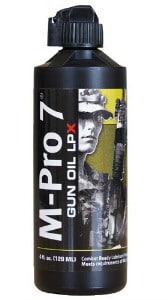 Why Do We Need Oil?
Why Do We Need Oil?
After hearing that a firearm is not very demanding of its lubricant, you might be wondering if you even need any sort of lubricant at all! The answer to this a very resounding yes. I’m sure you have all seen highly polished pieces of metal that are smooth and shiny. But if you look at those pieces of metal under a microscope, even the most perfect surface is suddenly full of bumps and ridges. When 2 pieces of metal slide against each other, all of those bumps and ridges collide with each other and cause friction. Oil provides a very thin layer of liquid between all of these imperfections and allows the 2 pieces of metal to smoothly glide over each other.
How Oil Lubricates
Believe it or not, different lubricants operate in very different ways. When it comes to oil, it provides a form of lubrication called “hydrodynamic.” Without going in depth into fluid mechanics, this is simply referring to how the liquid (in this case, oil) behaves under stress. Hydrodynamic lubrication is great under low-stress applications and provides excellent corrosion resistance. The problem with this, however, is that when it becomes subject to stress (such as when the slide of your handgun actuates) it likes to squeeze out from where you need it, leaving you unprotected.
Lubrication Additives
Woah Woah Woah, hold up! If oil just squeezes out and runs away, then what good does it do? Not much, really. That is why we have additives. This is the second form of lubrication that we get from a good gun oil, and it is called “boundary lubrication.” These boundary additives are incredibly tiny, microscopic solids that are very slippery. When these tiny particles are mixed in with the oil, they fill in the tiny hills and valleys in the metals contact surfaces. Since these very tiny particles are solids, they don’t get squeezed out under load. In fact, this is where we get most of our lubrication from when it comes to oil for our guns.
There are many different boundary lubricant additives out there, and almost all of them have incredibly long and hard to pronounce names. For the sake of simplicity, the only one I will mention here is the additives made from molybdenum compounds. These are my personal favorite additives (especially in grease) and I will prefer an oil with these compounds in it more than others. Unfortunately, very few companies who make gun oil will list out their additives, which means you basically just have to guess what’s in it. In the grand scheme of things, however, this doesn’t make that much of a difference. As long as something has a good boundary lubrication package, you are going to be covered.
Migration Additives
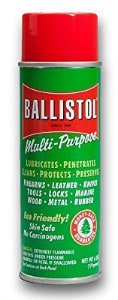 Migration is another property of oil that can be affected by oil type and different kinds of additives. Migration is the term used for how well the oil moves around on its own. For example, when you place oil on a pivot pin, migration will cause that oil to work its way throughout the whole joint, even though you only placed a small drop of oil in one place. At first, this sounds great. However, migration is a double-edged sword. The same properties that allow your oil to work its way down into all of the hard to reach places are the same property that allows your oil to get all over things it shouldn’t, including your gun cases and holster, or even your clothes!
Migration is another property of oil that can be affected by oil type and different kinds of additives. Migration is the term used for how well the oil moves around on its own. For example, when you place oil on a pivot pin, migration will cause that oil to work its way throughout the whole joint, even though you only placed a small drop of oil in one place. At first, this sounds great. However, migration is a double-edged sword. The same properties that allow your oil to work its way down into all of the hard to reach places are the same property that allows your oil to get all over things it shouldn’t, including your gun cases and holster, or even your clothes!
This brings up an interesting problem. For some firearms, a migrating oil is a great thing, and for others, it’s not. If you are lubricating a carry gun or something that is going to spend a lot of time in a case or holster, you are going to be much better off going with an oil that has minimal migration. But if you have a firearm that spends most of its time in the safe, or is not that one that you carry or transport on a regular basis, having an oil with good migration can be much more beneficial. Personally, I prefer an oil that is at neither end of the extremes. All the oils that I use have just a little bit of migration: just enough to get the oil where it needs to be without making a huge mess and getting where I don’t want it.
Viscosity Additives
Viscosity is the measure of how thick an oil is. Due to varying oil types and additives, oil can be anywhere from runny like water, to thick like molasses, and anything in between. What Viscosity is best is a huge area of debate among gun owners, and there are a lot of misconceptions out there. For starters, most people think that a thicker oil is better. In fact, nothing could be further from the truth. The reality is, where most people use a thick oil, you should really be using grease (we will get to grease later). Most of the parts that really need oil, and not grease, benefit the most from an oil that is thinner. For this reason, it is best to avoid the really thick gear oils and instead go with something much thinner.
There are 2 major scales used to actually measure viscosity: SAE and ISO. For our purposes, we don’t really need to go too in depth to what these numbers actually mean (especially because most gun oil manufacturers don’t list their viscosities). But if you do decide to pick up an oil off the shelf at your local auto parts store, I usually try to stick with something in the range of SAE 30, which is also equivalent to about ISO 100. As long as you pick up something in that range, you should be more than ok.
More Related Articles:
More Related Buyers Guides:
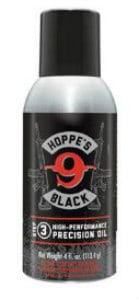 Pour Point Additives
Pour Point Additives
Pour point depressants are another important additive when it comes to our gun oil. For those lucky people who live in the south or another warm climate, this is probably going to be the least of your concerns. But for the rest of us, cold weather performance is going to be very important in our oil. This becomes especially true for those of us who are avid hunters. It is not entirely uncommon for deer rifles to malfunction due to the oil not performing in cold temperatures.
When oil gets too cold, wax crystals begin to form. Now a few of these small crystals isn’t too big of a problem, but as it gets colder they begin to grow and link together. Obviously, this is going to cause some significant problems, especially when this oil is used to lubricate firing pins or hammers. What a pour point depressant does is prevent these crystals from growing too large and linking together. This will still allow your oil to perform well during cold temperatures.
As a resident of the Midwest and an avid hunter, good cold weather performance is somewhat valuable to me. I would say roughly 25% of my shooting is in what could be considered “extreme weather” so I do like having an oil with a low pour point, although I certainly wouldn’t consider it my top priority.
Detergent Additives
When you hear detergent, the first thing to pop into your head is probably Dawn dish soap, and you’re not entirely wrong, even when it comes to oil. Detergent additives are synthetic compounds added to the oil that will help reduce the build-up of soot, carbon, and other contaminants. While a good detergent additive may be helpful in a good gun oil, it is pretty much at the bottom of the list as far as concerns go. While firearms do produce a lot of fouling, it is going to be nowhere near as much contamination as an oil would encounter in an engine or gearbox.
Corrosion Inhibitor Additives
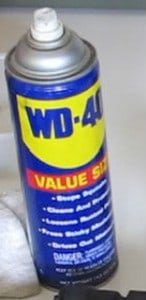 Corrosion inhibitors are another additive that can have huge benefits in a good gun oil. Obviously, half the reason we use oil on our firearms is to prevent rust, so any help in that department seems like a good thing. Corrosion inhibitor additives are really pretty simple and self-explanatory in what they do, but they may not always be a good thing. Products such as WD-40 and PB blaster have excellent corrosion inhibitor additives, but they make terrible gun oils. These types of additives are definitely a bonus when you are looking at gun oils, but you should not select your oil based only on these additives.
Corrosion inhibitors are another additive that can have huge benefits in a good gun oil. Obviously, half the reason we use oil on our firearms is to prevent rust, so any help in that department seems like a good thing. Corrosion inhibitor additives are really pretty simple and self-explanatory in what they do, but they may not always be a good thing. Products such as WD-40 and PB blaster have excellent corrosion inhibitor additives, but they make terrible gun oils. These types of additives are definitely a bonus when you are looking at gun oils, but you should not select your oil based only on these additives.
Antioxidant Additives
Over time, oil goes through a process called oxidation. This causes the oil to gel up and thicken, and become ineffective. I’m sure you all have compared the old, thick, nasty oil to your fresh, new, clean oil after an oil change in your vehicle. Most of that is due to carbon and fouling build up, but some of it is due to oxidation. Thankfully, there are additives that will help decrease and prevent this oxidation.
But let’s be honest here. Oxidation is a pretty minor problem when it comes to choosing an oil. Antioxidant additives are far more important for an oil for an engine or gearbox than it is for a firearm. It certainly doesn’t do them any harm, but I certainly wouldn’t pay a premium or sacrifice other additives just to get some good antioxidants.
Things To Avoid
If you’ve ever taken a look at the lubricants section of your local gun store, you have probably seen a plethora of products designed solely to get you to part with your hard-earned money. It seems like every year we get a “miracle” new product (cough fire-clean cough). The reality here is, there is no such thing as a miracle new gun oil. Believe me when I say that oil technology is very advanced, and to be honest we’ve gone about as far as we can go with it. Any product that claims to be “new” is nothing more than a slightly different combination of additives that we all already use and know about. Are some of these new miracle oils actually decent products? Sure. Are they all overpriced? Absolutely. And are some of them actually terrible for your firearms? For sure!
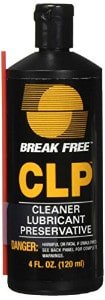 Vegetable, mineral oils, and silicone are other products that are good to avoid. That’s right when it comes to your firearms, good ‘ol fashioned petroleum is the way to go. Products such as fire-clean and Rem-Oil are terrible lubricants for your guns and I avoid them at all costs. I’m not totally against synthetic oils either, but in my personal experience, there’s just something about petroleum that makes my guns run so much better.
Vegetable, mineral oils, and silicone are other products that are good to avoid. That’s right when it comes to your firearms, good ‘ol fashioned petroleum is the way to go. Products such as fire-clean and Rem-Oil are terrible lubricants for your guns and I avoid them at all costs. I’m not totally against synthetic oils either, but in my personal experience, there’s just something about petroleum that makes my guns run so much better.
While almost all additives will give you some sort of benefit in your gun oil, there is one major one to avoid at all costs: chlorinated esters. The reason I am mentioning this product specifically by name is that this is actually an incredibly dangerous additive. Chlorine compounds actually work really well as boundary lubricants, but they are terrible for your metal. Chlorinated esters promote a phenomenon known as “stress corrosion cracking.” These compounds make small cracks and pits in the metal that, under heat and pressure (such as when you discharge your firearm) become large cracks and failure points. Obviously, this is very bad and should be avoided at all costs.
Benzene pour point additives are another good compound to avoid (at least for carry guns). While these won’t really do anything to harm your firearm, Benzene compounds are not very healthy to have around your skin. While this is rarely a problem when it comes to safe queens or other firearms who don’t make it to the range often, it’s certainly not something that I want sitting in an inside the waistband holster every day. If I was looking for an oil specifically for my deer rifle, then I wouldn’t worry about it. But since I usually try and stick with just a few good general purpose gun oils, I usually try to avoid it.
Dry lubricant is another product that has its place but is certainly not a general purpose lubricant. Dry lube, or graphite, is actually a crystalline powder that is very, very mildly abrasive. The benefit to dry lube, however, is that it does not attract dirt and fouling nearly as bad as petroleum based lubricants. Dry lube also offers no corrosion protection or any of the other benefits of petroleum lubricants, but it does have its place.
I love using dry lube on my gas operated firearms. I like to shoot large volumes of dirty ammunition in my guns, and due to this, I need something that is not going to collect fouling in my gas operated firearms (typically just my AR-15 and semi-auto shotgun). Dry lube allows me to go much longer without having malfunctions and greatly increases the reliability of my firearms. If these guns were simply just range toys, I wouldn’t worry about. But when it comes to competitions and hunting, I need a firearm that I know, without a doubt, that it is going to function 100% of the time when I need it to. And for that, I prefer dry lube.
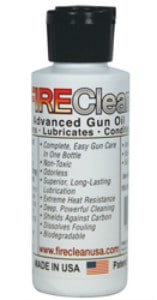 What To Look For in Gun Lubrication
What To Look For in Gun Lubrication
Thankfully, what to look for in a good gun oil is going to be very simple. First, start with only petroleum products. This will weed out any of the mineral, vegetable or silicone based oils that will cause you nothing but problems. Next, you’re going to want the best boundary lubrication package available. Since this is the primary form of lubrication needed for a firearm, getting the best boundary lubricants you can will be paramount. Once you’ve selected a petroleum oil with the best boundary lubricants you can find, the rest is all minor details and personal preference. Obviously, corrosion resistance is going to be a bonus, and I like to get something with a medium migration tendency. I also prefer a low pour point, but certainly, don’t make it a priority. Finally, I look for something that is going to be somewhere around SAE 30 weight in viscosity. If you can find a product that meets all of these criteria, then odds are you’ve got the right product for you.
Grease – And When To Use It
Wow, that was a lot of information! The world of oils can be very confusing and hard to understand. The good news is, grease is much simpler! Many people think that oils and greases have very little in common, but this is not the case. The fact is, they are almost the exact same thing! This is because grease is nothing more than the exact same oil that has been thickened, most of the time with a compound called a metallic soap. With grease, there are only a few things that you will need to look for.
In many cases, grease has almost the exact same additives as oil. So if you know what you’re looking for in an oil, you’ll just simply look for the same thing in a grease! One additional factor to look for in grease is reversibility. A common problem with grease is that the oil will sometimes separate from the thickening agent. Reversibility is the ability of the thickening agent to re-absorb any oil that was squeezed out. Obviously, this is a very desirable quality to have, and any grease you use on your firearms is going to have to have a very high reversibility.
Another thing to consider is that grease will often stain things like clothing and holsters. Brownell’s action lube, one of the more popular greases, is very bad about this. While it is a fantastic grease that works great for a lot of people, I avoid using it on any of my carry guns. The viscosity of grease is most commonly measured by the NLGI number. NLGI #0 grease is usually the best way to go in terms of a good firearms grease, but #1 can be used as well. The 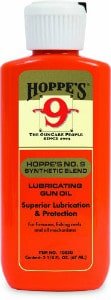 higher the NLGI number, the thicker the grease. While NLGI #0 is a good all-around viscosity, you can go up or down slightly depending on your climate and shooting conditions.
higher the NLGI number, the thicker the grease. While NLGI #0 is a good all-around viscosity, you can go up or down slightly depending on your climate and shooting conditions.
One of the most important factors of a good grease lies not in the grease itself, but how you use it. In any gun lubrication regime, both oil and grease have to be used. Knowing when and how to use grease is just as important as knowing how to choose the right grease. The old adage “if it slides, grease it. If it rotates, oil it” is certainly still true to this day. Oil is fantastic for pivot pins, hammers, corrosion resistance, and the like. But grease is the way to go for slides, bolts, and other times where 2 pieces of flat metal must slide against each other.
As long as you choose a moderately thick grease with the best boundary lubrication you can find and good reversibility, 9 times out of 10 you will have a fantastic grease. And as long as you only use it on things that slide, such as actions, bolts, and slides, you will have yourself a winner. You would be surprised how many people simply don’t use a good grease in their lubrication regimen. If you haven’t already, adding a grease to your lube kit is a great thing to do.
Gun Lubrication Final Thoughts
Wow, oil and grease sure is a complicated subject! I know all of this information seems incredibly overwhelming, but I can promise you that it’s really not. The fact is when it comes down to it gun oil is fairly difficult to mess up. Weeding through all the options to find the absolute best can be a bit tricky, but you’re probably not going to ruin your gun as long as you don’t choose anything with a chlorinated ester boundary lubricant. At the end of the day, as long as you select a petroleum oil with good boundary lubricants, you’re going to have a very good product that will serve you well. I sincerely hope you enjoyed reading this article, and I hope you are able to put its practical knowledge to use. Thank you for visiting Reloadingpresso.com. If you’re looking for more than what you see here, please review our Best Reloading Kit Buyers Guide and our Best Gun Safe Buyers Guide.
Footnotes:
Even More Related Buyers Guides:
- Wikipedia: Pour point depressant
- Wikipedia: Oil additive
- Grant Cunningham: Lubrication 101: Gun oil, snake oil, and how to tell the difference.
- Carid: What is Oil Viscosity, and Why is It Important To Me?

Dan is an avid outdoorsman and shooter who developed a passion for firearms at an early age. When you can’t find him in the field chasing birds or big game, you can find him at the range shooting various competitions such as 3-gun, IPSC, and IDPA. He also enjoys manufacturing his own ammunition, as well as both working on, and building his own firearms. Dan has many years of firearms experience, and enjoys helping people find the right gear and sharing his extensive firearms knowledge.
